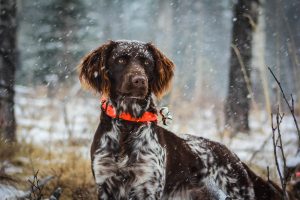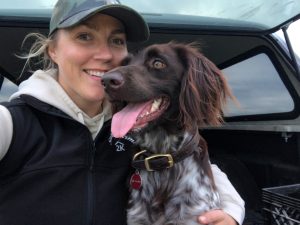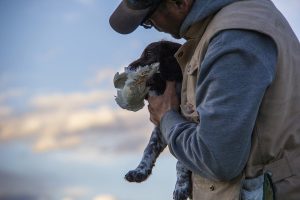In our search for a breeder of Small Munsterlander pups, we were extremely lucky to find one a mere 20 minute drive away. Tanner and Toby run their operation a little North of what used to be a small town, on a acreage with horses, goats, chickens, pigeons and quail, and two blocks of kennels inhabited by their band of very merry Munsterlanders.
 Tanner and Toby are very personable individuals, who make you feel welcome from the get go, and who go to great lengths to show off their dogs and provide you with all the info you need to make a decision on whether a Small Munsterlander is for you.
Tanner and Toby are very personable individuals, who make you feel welcome from the get go, and who go to great lengths to show off their dogs and provide you with all the info you need to make a decision on whether a Small Munsterlander is for you.

 Not being a person that makes decisions on the fly, with a desire to control all parameters that borders on the unhealthy, I struggled a lot through the process of selecting a pup, or rather selecting three. When the sorting was all done, and all the pups had traveled home with their new owners, I asked Tanner and Toby to put some words to paper about the history of their kennel, their breeding program and more specifically how they deal with the process of matching pups to owners.
Not being a person that makes decisions on the fly, with a desire to control all parameters that borders on the unhealthy, I struggled a lot through the process of selecting a pup, or rather selecting three. When the sorting was all done, and all the pups had traveled home with their new owners, I asked Tanner and Toby to put some words to paper about the history of their kennel, their breeding program and more specifically how they deal with the process of matching pups to owners.
Four Point Kennels history – how did you come to the Small Munsterlander breed, and what attracted you to starting the kennel and your breeding program?
Tanner was looking for a dog for his Dad to hunt with that could do both waterfowl and upland game, but smaller than a Labrador Retriever. After researching and contacting a few breeders, Hunting Hills’ Vivi Katy was welcomed into the family as Wayne’s dog. Soon after falling in love with the versatility of Katy, Robingun’s Cindy Lou Who arrived as a female breeding prospect.
What are your goals/visions for your line of breeding?
Our goal as a kennel is to breed healthy, stable Small Munsterlanders who are also well balanced, loving companions in the home. A dog’s temperament is as significant as their hunting ability so we strive to produce truly versatile hunting dogs that can not only hunt but also be a lifelong member of a family. Each litter is planned for the improvement of the breed and our breeding program.
How did you pick the name “Four Point” for your kennel?
Four Point Kennels was chosen with a compass in mind. Being a symbol for guidance, and the ability to point you in the right direction, in a way our bird dogs act like a compass for directing us to where game birds are. We also wanted to see the pups we were producing go in all directions across North America.
How do you get prospective buyers? Do they contact you? Do you have to advertise?
We do not advertise our dogs. People tend to find us through internet searches, social media platforms or word of mouth. They usually contact us by phone or email, or fill out a puppy application located on our website.
What criteria do you apply to prospective buyers?
We only sell to hunting homes, so it must be a hunting home in order for us to place one of our pups with a prospective buyer. Our dogs love us, but they live to hunt. We want to see them doing what they were bred to do. Obviously having previous dog experience (hunting dog or not) is always a plus. Wanting to test their pup in NAVHDA (North American Versatile Hunting Dog Associating) OR AKC/CKC trials is an asset as well. We view puppy applications as a prospective buyer’s resume.
What does your ideal future Four Point puppy owner look like?
Someone or a family that is going to love the heck out of their hunting partner and companion. Hone the dog’s natural ability and desire to hunt game. Obviously hunt with their dog. We love to get updates on the pups we’ve put on the ground and are here to help our puppy owners, so not being afraid to reach out when they have questions, or are stuck on something during training.
When multiple people express a liking for the same puppy how do you manage that?
This is one of the main reasons we ask puppy buyers to pick their top three and we place the pup within that is best suited. It eliminates picking a pup based off of looks and markings, and sets our buyers up for better success with personality being the priority. We often breed a roan to a brown/white so we can get roughly a 50/50 roan to brown/white ratio. We try to accommodate buyers’ preference in colouring, but if there are only three roans out of six males, we will just tell people they need to drop a roan from their list and add a brown/white. If they don’t want to, they will have look elsewhere for their Small Munsterlander pup, or be bumped to the next litter.
How do you go about assessing the personality of future owners, and that of the puppies?
Quite often a casual conversation about our dogs and hunting will tell us a lot about future owners. Often people will send us an email telling us about their lifestyle giving us a small glimpse into their lives, which always helps as well. If you live close to us, it’s easier for us to get an idea of personality types. If you live a long distance from us, we make an effort to either phone, email or text multiple times to keep things fresh when we start looking to place the pups.
What process do you go through to match owners/puppies? How much is reasoning, and how much “gut feel”?
We’re probably looking at 50/50 for reasoning and gut feel. We spend a lot of time with the pups we are raising. So we get to see their personalities develop, and sometimes change as the dynamic in the litter changes, or they are introduced to new things. For example, a baby bird dog can tell you a fair amount about their personality during their first encounter with a pigeon or coturnix quail.
When we have a puppy buyer that does more waterfowl hunting, we look for pups with a high retrieving desire or wanting to pack a toy around in their mouth at a young age. We don’t really take the size of the pup into consideration as sometimes the runt of the litter is no longer a runt in their new home. Our stud dog Camilo is a whopping 42lbs and will retrieve Canada geese for us repeatedly. He has a lot of heart in a tiny package.
If we have a first time pointing breed owner, we tend to avoid placing the alpha bitch with them, or a pup that tends to be more independent compared to other pups. We want our puppy buyers to be successful with their hunting partners, and we strive to put pups on the ground that anyone can train whether this is your first hunting dog, or your fourth. If you are a loud boisterous person, we don’t necessarily want to put a timid pup with you, or put a timid pup with a young family. Ultimately, the personalities need to match.
It’s hard to describe hunting characteristics besides waterfowl hunting and having a strong desire to retrieve. With upland hunting, the genetics should be there based off of the sire and dam pairing. So besides seeing the more methodical puppy that points and watches the quail fly off, or the pup that is more bold in their approach and points the quail, but then wants to chase it down and pick it up, puppy placement goes more towards personality of the person and pups at that point.
Find out more about Four Point Kennels and their dogs at www.fourpointkennels.com/